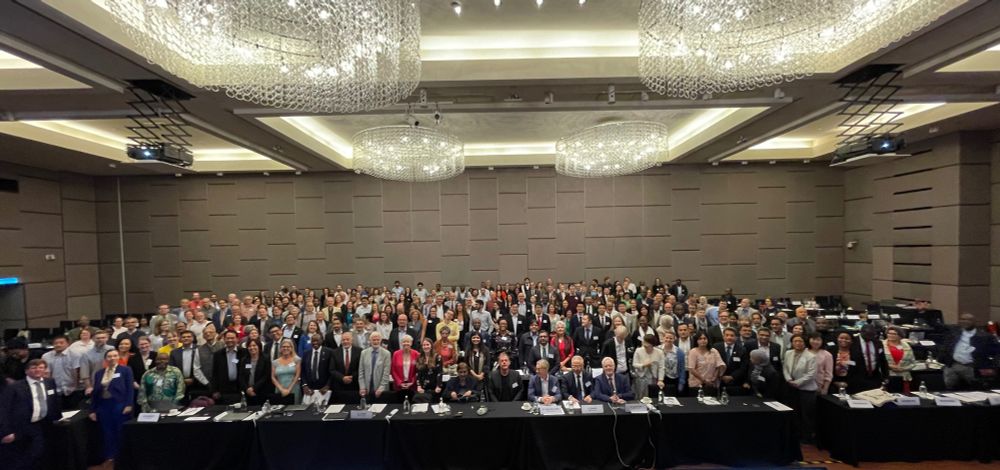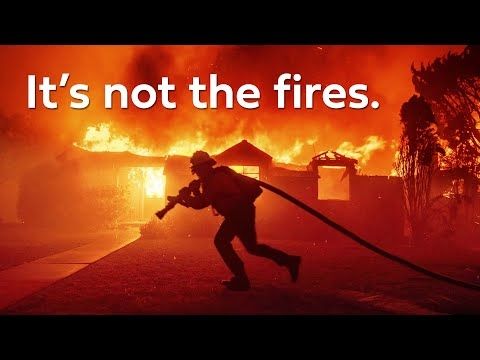
NSF Unidata Pause in Most Operations
NSF Unidata Pause in Most Operations
Due to the current gap in funding from the U.S. National Science Foundation (NSF), the NSF Unidata Program is pausing most operations effective 12 May 2025. Nearly all staff will be furloughed until funds from our existing NSF grant become available. For more information, see buff.ly/d2TC1Oy
09.05.2025 16:00 — 👍 61 🔁 54 💬 4 📌 29
WMO State of the Climate report (spoiler alert: it’s not great).
@hausfath.bsky.social and I have a short article in it looking at the contributions to the temperatures in 2023+2024.
wmo.int/sites/defaul...
19.03.2025 12:01 — 👍 56 🔁 19 💬 4 📌 1
Have you ever heard about PMOC? This is the equivalent of AMOC, but in the pacific and it could emerge to compensate the AMOC weakening.
27.02.2025 14:08 — 👍 28 🔁 10 💬 0 📌 0
The IPCC AR7 draft report is public. For those who thinks that climate science is a hoax done behind closed doors, go have a look, we have nothing to hide. #climate #IPCC
08.02.2025 17:37 — 👍 5 🔁 3 💬 0 📌 0
I'm surprised that AR7 is done already. Shouldn't it be based on the CMIP7 datasets?
08.02.2025 17:34 — 👍 0 🔁 0 💬 0 📌 0
The Arctic is among the most dramatically affected regions on Earth, where the impacts of global warming are unfolding at an unprecedented rate.
08.02.2025 02:04 — 👍 3 🔁 0 💬 1 📌 0
Hi Bluesky
I am a research assistant specializing in physical oceanography. After spending 10 years at Fisheries and Oceans Canada, I am now employed at Environment and Climate Change Canada (ECCC), where I work on ocean modeling as part of the Canadian Climate Earth System Model (CanESM).
06.02.2025 16:34 — 👍 131 🔁 10 💬 7 📌 1
YouTube video by Simon Clark
The scariest thing about the LA fire
Watching and reading the coverage of the LA fires, I was struck by something I've not seen discussed elsewhere.
These fires are a sign of things to come, but not in the sense you're probably thinking.
youtu.be/2LyRE8pYJJQ
21.01.2025 17:10 — 👍 83 🔁 13 💬 3 📌 6
YouTube video by Simon Clark
The scariest thing about the LA fire
Excellent video from @simonoxfphys.com.
youtu.be/2LyRE8pYJJQ?...
The LA fire is not just a climate adaptation problem, but a climate communication problem. Communication often done on social media.
21.01.2025 21:33 — 👍 30 🔁 9 💬 0 📌 1
Is it the same if we look at the entirety of the water column?
19.01.2025 20:43 — 👍 0 🔁 0 💬 1 📌 0

À Halifax, le piégeage de carbone dans l’océan prend de l’élan
Ce projet d’alcalinisation artificielle est le plus avancé dans le monde.
[1/3] À #Halifax, des chercheurs testent une solution innovante : l’alcalinisation artificielle des océans. Depuis 2023, 278 tonnes de brucite ont capté 138 tonnes de CO2. Le port est un laboratoire à ciel ouvert, surveillé pour garantir l'équilibre écologique. #geography #geoengineering
19.01.2025 07:54 — 👍 3 🔁 1 💬 1 📌 0
So others study that concluded the opposite, that AMOC had decreased, might have been mislead because they use SST as a proxy for the AMOC circulation?
16.01.2025 14:16 — 👍 1 🔁 0 💬 1 📌 0
A study shows that AMOC might have not declined since the 1960s. They use CMIP6 models and reanalisys to come to that conclusion.
Other study that concluded that AMOC gas decreased might have been mislead by using a proxy, SST, that has a lower relationship with AMOC than previously thought.
16.01.2025 14:14 — 👍 4 🔁 1 💬 0 📌 0
I find this hilarious 😆.
10.01.2025 23:06 — 👍 2 🔁 0 💬 0 📌 0

There is a very interesting article in @nature.com about the Applications of generative #artificialintelligence to influence #climatechange decisions. An example from the article is the image below titled "Deceptive Image Shows Influential Climate Skeptic Planting a Tree."
rdcu.be/d5Une
10.01.2025 23:05 — 👍 2 🔁 0 💬 2 📌 1
These are the key facts everyone needs to know about climate change, according to @yaleclimatecomm.bsky.social.
I shared this post across 7 different social media platforms, including FB, LI, Mastodon, Threads, X and Twitter both pre-and post-Musk.
Here's how their engagement stacked up. 🧵
06.01.2025 22:28 — 👍 698 🔁 220 💬 32 📌 48
Are there region in the Arctic where this positive feedback loop is more important? I guess where the inflow from the rivers are more important...
07.01.2025 02:07 — 👍 1 🔁 0 💬 0 📌 0

The @ipcc.bsky.social #AR7 scoping meeting successfully took place in Kuala Lumpur last week, with more than 230 experts from 70 countries drafting the outlines of the three Working Group contributions to #IPCC's seventh report assessing policy-relevant science on #climatechange.
16.12.2024 13:06 — 👍 96 🔁 20 💬 5 📌 3
Yes indeed, interactive ice sheet models would provide better representation of the fresh water inflow not only from Greenland but from Antarctica too. I hope to see them soon in our earth systems models.
24.12.2024 01:43 — 👍 3 🔁 0 💬 0 📌 0
Ice shelf behavior is hard to predict but what is the fresh water forcing from Greenland reach by our current high emissions scenarios? Are we even close to 0.6 Sv?
23.12.2024 21:35 — 👍 0 🔁 0 💬 2 📌 0
AMOC is one the hardest phenomenon to get right in our model and yet, it is one that can have the biggest impact on climate.
23.12.2024 21:27 — 👍 5 🔁 1 💬 0 📌 1
Do we know how the Irminger sites will be affected with the increase of GHG? What are the projected freshwater inflow around Greenland from the current climate models?
22.12.2024 23:49 — 👍 0 🔁 0 💬 0 📌 0
One of the biggest questions we get is when will our journals be here. We thank you for your patience.
You can now follow our journals with this starter pack!
18.12.2024 14:57 — 👍 403 🔁 151 💬 20 📌 32
New starter pack!
Climate change and fossil fuels affect our health in a myriad of ways. That's why solutions for clean energy, nature, and climate resilience can also be solutions for better health.
These experts + organizations are helping us make those connections ⬇️
Who'd I miss?
15.12.2024 21:37 — 👍 234 🔁 77 💬 34 📌 10
Hi,
Can you add me to the feed please?
Thank you.
06.12.2024 03:00 — 👍 0 🔁 0 💬 1 📌 0
For me is "How the ocean will react to global warming and for how long?"
That is a very broad question 😅.
04.12.2024 18:36 — 👍 1 🔁 0 💬 0 📌 0
This region is greatly influenced by the melting water from the Greenland ice shelf, which is very difficult to model because it behave in a non-linear way. The next generation of earth systems models are going to be better at modeling this phenomenon.
04.12.2024 01:33 — 👍 3 🔁 0 💬 1 📌 0
The Arctic is very hard to get right in earth systems models. The ocean, the atmosphere, the sea ice and the ice shelf all interact on each other and one bad parameterized phenomenon can lead to completely wrong answers.
04.12.2024 01:10 — 👍 2 🔁 0 💬 1 📌 0
Canadian water wonk advocating for the environment and economy. Executive Director, DataStream Initiative. 🍁#LakeErieLove #waterquality #opendata #nibi #Canicross
Climate scientist & oceanographer. @royalsociety.org Professor @uniofeastanglia.bsky.social . Member @thecccuk.bsky.social #carbonbudget author.
Physics, bubbles, oceans, hot chocolate and curiosity. Professor at UCL, writer, broadcaster. Author of Storm in a Teacup and Blue Machine https://linktr.ee/helenczerski Co-host of BBC Radio 4's Rare Earth
NSF Unidata Program Center. NSF Unidata exists to serve a community of researchers and educators dedicated to advancing the frontiers of Earth Systems science with data access, tools (e.g. NetCDF, AWIPS, IDV, MetPy, THREDDS, LDM), and community support.
Your least favourite person's least favourite award-winning journalist✨
Follow for short-form videos on issues that matter! 💅
SUBSCRIBE: rachelgilmore.substack.com/
https://linktr.ee/rachel_gilmore
Climate change, cycling, cocktails, and the Oxford comma. Westphal in a non-Westphalian world. Head of Science, IPCC Working Group III TSU; Adjunct Prof, Georgetown University.
Ph.D., Climate Change, Programme&Monitoring Expert at FAO
Changemaker for climate 💚
Interested in genetics & attitudes to climate change. Once did research - now teach mostly. Trying to figure out what to do here. Serious science stuff or bad cartoons?
https://scholar.google.com/citations?user=9aCZK5sAAAAJ&hl=en
Chief Meteorologist at WBZ-TV in Boston, MA.
Storms, nature, sports, beer. Not necessarily in that order.
Directeur affaires publiques, relations internationales et mobilisation
Comité consultatif sur les changements climatiques du Québec.
Ensenyo física i sóc un "explorador" de llibres de ciència en llengües minoritzades (Català, Gaeilge etc.). Et je m'indigne en français aussi parfois. @revolutionpermanente.fr
Journaliste à La Presse et président de la Fédération professionnelle des journalistes du Québec (FPJQ).
Research Meteorologist at Canadian Severe Storms Lab (CSSL), Northern Hail Project (NHP). Opinions are my own.
Proud Democrat on Maui 🦋 Biologist, conservationist, ecologist, farmer, teacher, wife, mother, daughter, and collaborator to make our world a better place. 💙 #GoodTrouble 💙 #BlueWave 💙 #BlueOleta
AFP journalist covering climate mis/disinformation 🌊🌎 • Previous bylines with Politico, Reuters, Eater • Imagineering nerd ✨ • She/her • Got a tip for me? DM or firstname(dot)lastname(at)afp.com 📨
Glaciologist @Scripps Institution of Oceanography
Schmidt AI in Science Postdoc
Formerly @British Antarctic Survey
🛰️❄️🇦🇶🇬🇱🇬🇧
Professor of Glaciology at Scripps Polar Center, UC San Diego
https://bsky.app/profile/scrippsocean.bsky.social
Studies Antarctica with satellites
🇦🇶🛰️🧊
Graduate of @UCL & @UTAS
Happy to be safely on Bluesky
❄️❄️❄️
Dialogues on Climate Change is a peer-reviewed journal that aims to stimulate open and critical debate on key issues in climate change science and research https://journals.sagepub.com/home/DCC
Climate economist. Opinions are my own.
Assistant professor in the Humphrey School of Public Affairs, University of Minnesota. Sociologist/demographer studying the health impacts of climate change and dams, with a focus on Brazil and East Africa.
https://sites.google.com/umn.edu/heatherrandell







